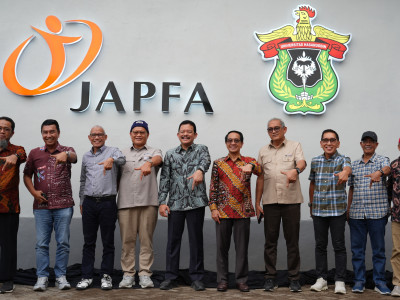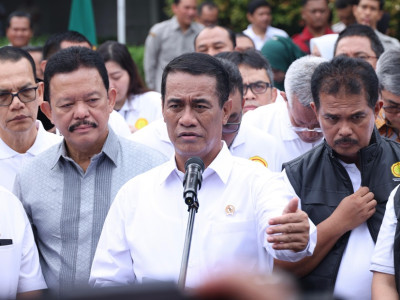Indo Snaps up Top End's Best Known Cattle Stations
INDONESIAN commercial interests have snapped up two of the Top End’s best known cattle stations in a deal secured today for an undisclosed amount.
Speculation that Inverway and Riveren stations - owned by the popular Underwood family - would be sold to Indonesians buyers was confirmed today in a statement to Fairfax Agricultural Media, from Japfa Santori Australia Director Bruce Warren.
Inverway Station is a 2538 square kilometre holding which was the Underwood family’s traditional home when they first moved to the Northern Territory in 1956.
The Station was purchased by John and Terry Underwood''s family about seven years ago to add to their Riveren Station holding which measures 3016 square kms.
In total, the two stations carry about 40,000 mixed Brahman cattle.
Mr Warren has been involved in the negotiations on behalf of Santori but has remained tight-lipped in recent weeks as speculation has escalated around foreign investment.
He said the Japfa group - Santori’s parent company and one of Indonesia’s largest integrated agri-businesses - had a mission to produce animal protein in beef, poultry and aquaculture.
Riveren and Inverway will only supply about 6 percent of Santori’s beef protein requirements, he said.
Mr Warren said the Indonesian company had purchased cattle off the Riveren and Inverway stations from the Underwoods for many years and “know the quality of the cattle, operation and family”.
“The Underwoods have been great supporters of the live trade and Santori,” he said.
“Santori take this opportunity to thank the Underwood family for the great legacy that they are entrusting to us.
“Michael and Georgia Underwood have agreed to stay on to manage the properties, to continue the legacy and the high standards that have become synonymous with the Underwood name.”
Speaking to Fairfax Agricultural Media, Patrick Underwood also declined to say what the two stations were sold for but said it was good news given the stations had been on the market for some time.
But it was also a sad day for him and his family, given their long history with both stations and the northern beef cattle industry.
Mr Underwood said talk of the Indonesian government buying the properties was just speculation, as Santori was the cattle business of the Japfa group which is a privately owned entity.
“We’re very pleased to be in this position because a lot of properties have been up for sale but haven’t sold in recent times,” he said.
"But it’s a sad time for our family because these properties have been a big part of the family since we moved here in 1956.
“But my brother and his wife are staying on to manage the two properties, the staff members are staying on and they will use the same suppliers so it’s business as usual.”
Mr Underwood said since 2008, land and cattle prices had fallen in northern Australia placing a lot of financial pressure on the industry.
The reduction in cattle permits for exports to the Indonesian market had also taken its toll, in addition to “soft” prices in the domestic market and several poor seasons.
“It’s a straight profitability problem at the moment,” he said.
Mr Underwood said while some people were being critical of foreign investment he was highly supportive.
He said Indonesia understood the beef supply chain between the two countries, including government regulations, making any investment “entirely logical”.
Australia also invests in Indonesian feedlots and facilities, he said.
Mr Warren said originally, Santori wasn’t looking to purchase property and their intention was to offer some support to NT property owners suffering due to the crisis of the live cattle ban.
He said Santori’s idea was to offer immediate financial relief by purchasing the cattle herd and leasing the property.
A management contract would then be given to the owner for continued management of cattle and property, he said.
“As hard as Santori tried to find a partner, not one bank or agency contacted, had clients in need of assistance,” he said.
“Santori had felt their offer would be a win-win situation.
“Financial assistance and breathing space for the property owner and a small insurance policy on cattle numbers for ourselves.”
Mr Warren said Santori felt that when the Indonesian trade eventually opened up there would not be enough cattle available.
He said if Indonesia raised cattle import permits in 2012, to 375,000, the NT could not have supplied the volumes required.
Many property owners have had to change their production to suit other destinations, he said.
“In the end we realized we would have to purchase if we wanted some security in numbers,” he said.
“At the same time a purchase would give us some vertical integration which from a marketing point of view is a plus.
“It would also allow us to work on genetic improvements, keeping our male feeders entire and turning off feeders at lighter weights, allowing for more breeders.”
Mr Warren said Santori realised the ongoing debate in Australia regarding foreign ownership but “is not sure what all the fuss is about”.
“At the end of the day we are simply caretakers - like the Underwood family and the Farquharson family before that,” he said.
“These properties will still be here long after we are all gone.
“Santori wants to ensure that the properties become more productive, sustainable and provide mutual prosperity to all stakeholders when it is time to pass it on.”


